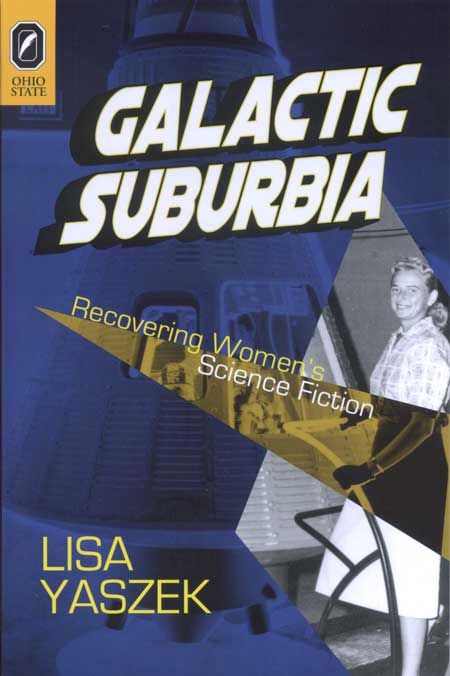Galactic SuburbiaRecovering Women’s Science FictionLisa Yaszek |
 Dec 2007 Literary Criticism/Science Fiction & Fantasy; Literary Criticism/Women Authors 234 pp. 6x9  $32.95 paper 978-0-8142-5164-5 Add paper to shopping cart Shopping Cart Instructions Review/Change Shopping Cart & Check-out | |||
|
• leave / read comments and critiques of the book • Explore More The Science Fiction Research Association The Feminist Science Fiction, Fantasy, and Utopia Resource Webpage |
“[M]eticulous, exhaustively researched, deftly written, and framed by a rich history of postwar American culture and its effects on gender roles. . . . exceptionally informed and enlightening.” —Tulsa Studies in Women’s Literature “Galactic Suburbia, on the one hand, serves as a rich reference resource for studying relatively unknown female science-fiction writers and, on the other, makes nuanced arguments about the formation of literary genres, women’s work, domesticity, and scientific endeavors. Yaszek’s book is not to be missed by scholars of science fiction and gender studies.” —H. Austin Booth, author of Reload: Rethinking Women & Cyberculture In this groundbreaking cultural history, Lisa Yaszek recovers a lost tradition of women’s science fiction that flourished after 1945. This new kind of science fiction was set in a place called galactic suburbia, a literary frontier that was home to nearly 300 women writers. These authors explored how women’s lives, loves, and work were being transformed by new sciences and technologies, thus establishing women’s place in the American future imaginary. Yaszek shows how the authors of galactic suburbia rewrote midcentury culture’s assumptions about women’s domestic, political, and scientific lives. Her case studies of luminaries such as Judith Merril, Carol Emshwiller, and Anne McCaffrey and lesser-known authors such as Alice Eleanor Jones, Mildred Clingerman, and Doris Pitkin Buck demonstrate how galactic suburbia is the world’s first literary tradition to explore the changing relations of gender, science, and society. Galactic Suburbia challenges conventional literary histories that posit men as the progenitors of modern science fiction and women as followers who turned to the genre only after the advent of the women’s liberation movement. As Yaszek demonstrates, stories written by women about women in galactic suburbia anticipated the development of both feminist science fiction and domestic science fiction written by men.
| |||


